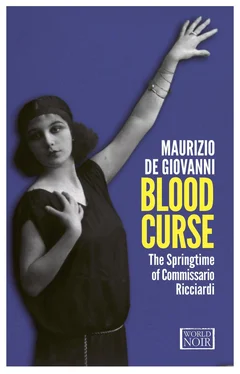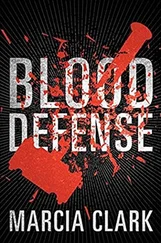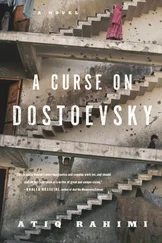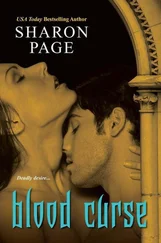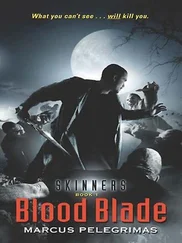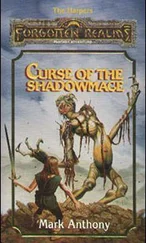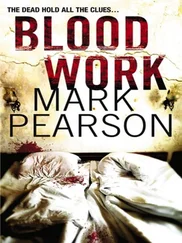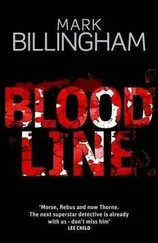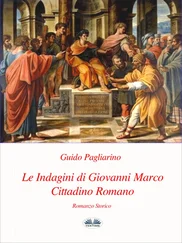Maurizio de Giovanni - Blood Curse
Здесь есть возможность читать онлайн «Maurizio de Giovanni - Blood Curse» весь текст электронной книги совершенно бесплатно (целиком полную версию без сокращений). В некоторых случаях можно слушать аудио, скачать через торрент в формате fb2 и присутствует краткое содержание. Жанр: Исторический детектив, Исторический детектив, на английском языке. Описание произведения, (предисловие) а так же отзывы посетителей доступны на портале библиотеки ЛибКат.
- Название:Blood Curse
- Автор:
- Жанр:
- Год:неизвестен
- ISBN:нет данных
- Рейтинг книги:3 / 5. Голосов: 1
-
Избранное:Добавить в избранное
- Отзывы:
-
Ваша оценка:
- 60
- 1
- 2
- 3
- 4
- 5
Blood Curse: краткое содержание, описание и аннотация
Предлагаем к чтению аннотацию, описание, краткое содержание или предисловие (зависит от того, что написал сам автор книги «Blood Curse»). Если вы не нашли необходимую информацию о книге — напишите в комментариях, мы постараемся отыскать её.
Blood Curse — читать онлайн бесплатно полную книгу (весь текст) целиком
Ниже представлен текст книги, разбитый по страницам. Система сохранения места последней прочитанной страницы, позволяет с удобством читать онлайн бесплатно книгу «Blood Curse», без необходимости каждый раз заново искать на чём Вы остановились. Поставьте закладку, и сможете в любой момент перейти на страницу, на которой закончили чтение.
Интервал:
Закладка:
VII
Ricciardi left his office at eight at night. He hadn’t allowed himself many breaks during the day; around one that afternoon he’d stepped out to buy a pizza from a street vendor, attracted by the column of smoke rising from the oil pot which also served as a sort of sign. Tata Rosa would not only disapprove of his choice, she would have gone on muttering for hours: You don’t think about your health. You might as well just shoot yourself in the head, she would have added. Better to just tell her he’d skipped lunch entirely.
It hadn’t been a very good day. He’d spent it filling out forms, which were destined to go on moving from desk to desk ad infinitum. He often felt like a miserable accountant, unable even to grasp the few rigid formulas he used to reckon up the evil he encountered, an evil he struggled to express in rational terms. As if perversions, savage emotions, rage, and hatred could be put into words.
Not that there was any shortage of murders; what was missing now was action, the open air, movement. He never felt comfortable shut up inside four walls, even knowing what awaited him out there; that’s the way it had always been. A leftover from his years at boarding school as an adolescent, most likely. People shunned him back then as they did now, driven away by the instinctive perception of some unnatural sorrow that he harbored within; even in a school full of cruel boys, ready to lash out at the slightest oddity, he went his solitary way, allowed safe passage and a wide berth. He couldn’t remember being pained by the experience; all things considered, he’d been better off that way. When you’re acquainted with the Deed, he thought, what are you going to tell a friend? Are you going to tell them what the dead tell you?
The hallway was dark. Almost everyone had gone home. That’s how it always was: he was the first one there in the morning, the last one to leave at night.
He knew what he’d see and, sure enough, he saw them: standing side by side on the second step of the broad, empty staircase, arms linked like a couple of old friends: the cop and the robber, like in the children’s game of that name.
In their way, they were an anomaly in the world of the Deed: it had been two years now, and Ricciardi could still see them, faintly luminescent in the half-light; maybe because of the magnitude of the surprise, or maybe because there were two of them. He remembered the event clearly. It had been one for the books: a small-time ex-con, arrested after a brawl, had grabbed for the holstered revolver of one of the two officers leading him to his cell and had fired a bullet into his own temple. A bad break: the bullet had shot straight through his head and continued on, killing the officer to his left as well.
As he walked past the pair, Ricciardi heard for what seemed like the thousandth time the words they kept repeating on an endless loop. The convict was saying, “I won’t go back, I won’t go back in there,” the police officer, “Maria, Maria, oh, the pain.” Not Maria the Virgin Mary-Maria his wife.
The right side of the jailbird’s head, the one run through by the bullet, was destroyed: the gaping hole, the scorched skin all over his face, the eye socket vacated by the burst eyeball, brain matter splattered across his shoulder and chest. On the left side, only a small wound where the bullet had emerged to go hurtling into the head of the guard. The officer’s right eye was a deep red, as if a gnat had wandered into it, when in fact it was tinged with the blood that had flooded his brain. Eyes downcast on the steps, seeing without looking, Ricciardi whispered along with the dead officer, barely moving his lips, “Maria, the pain,” as though it were the punch line of a familiar joke. He walked quickly through the half-open front door, ignoring the hostile gaze of the watchman who had snapped a sharp salute. He needed some air.
Even at that time of night, when the shops and cafés were all closed, Via Toledo swarmed with both the living and the dead. It had officially been called Via Roma for sixty years now, but for the people of the city the street’s name had never changed: it was Via Toledo when the occupying Spaniards built it, and it was Via Toledo now, as Ricciardi crossed it, brushing past the mendicants begging for bread, coins, attention. Whatever one wished to call it, the real name of that street was “borderline.” A boundary dividing two populaces as different as night and day, pitted against each other in a tacit, unending war. Each of those who clutched at the hem of his overcoat considered himself heir to a uniquely unfortunate lot in life. And yet every one of the countless shades of passion could be traced back to two primal needs: procuring immortality through procreation and feeding oneself and one’s family. Power and the abuse of power, honor and pride, comfort and envy: all of them the spawn of hunger and love.
Enrica ate her dinner while her father and brother-in-law argued. She was accustomed to the lengthy political diatribes that accompanied the evening meal: both she, the eldest daughter, and her mother and siblings had realized by now that there was no avoiding them, much less breaking in or changing the subject; so they might as well just eat their meal and let the two of them keep going at it after dinner, sitting over by the radio. That was the moment she awaited eagerly, all day long and perhaps even at night, as overbrimming with desire as she was in her dreams. She had become a skilled actress, able to feign interest in the argument underway when on the inside she was actually pursuing her own thoughts. She could hardly wait for dinner to be over and for everyone to troop off into the living room, leaving her to wash the dishes. It was a routine she liked: her stubborn, radiant, introverted, and sensitive nature had always made her a precise, orderly person. She was happiest when everything was in its place and everyone was doing their job, and the kitchen was her own personal domain. She didn’t want anyone’s help. She wanted to be left alone.
And besides, she had a date.
VIII
Ricciardi ate, and Tata Rosa watched him eat.
The same thing every evening. He would rather have come home to find she’d already retired for the night, since she was seventy years old and had been up since dawn. But she refused to relinquish her fundamental principle: she would not go to bed until she’d seen him eat every last bite. He would gladly have foregone the same narrow selection of dishes. She complained that she didn’t how to cook anything different. All he wanted was to give his brain a rest. She spent the whole day charging the batteries of her complaints and waited for him to walk through the door to unleash them on him. It’s idyllic, no doubt about it, mused Ricciardi as he chewed, without tasting it, a mouthful of spaghetti with basic, routine tomato sauce, the third time in six days it had been on the menu.
“It’s a sad, miserable life you lead. Just look, you had your hair cut yesterday and you’ve already got your bangs in your eyes again. And look at you, you’re pale, so pale that you look like a ghost.” At this, Ricciardi grimaced wryly. “Tell me, do you ever see daylight? Today, for example, there was a scent in the air that blew down from the forest of Capodimonte, it was just lovely, but did you even think of taking a walk in the gardens in front of police headquarters? No, eh? I knew it. What’s a poor old woman like me supposed to do? Am I supposed to close my eyes once and for all, condemned to the knowledge that I’m leaving you with no one to take care of you? Don’t you want to find yourself a pretty guagliona , so you can put me in a hospice and let me die in peace?”
Ricciardi gravely nodded in agreement, occasionally looking up from his food to show his full appreciation of the disaster that had befallen his Tata, whose dreadful fate it was to have to look after him. He hadn’t actually heard a single word she’d said. Still, he could have recited her litany word for word; he’d listened to it so many thousands of times over the years. He had other things on his mind, as usual, and he dealt with Tata Rosa the way you deal with the rain: you wait for it to end and do your best to stay dry. If he so much as dared to answer back, he’d have to spend the rest of the evening persuading his Tata that there was no life he’d rather live.
Читать дальшеИнтервал:
Закладка:
Похожие книги на «Blood Curse»
Представляем Вашему вниманию похожие книги на «Blood Curse» списком для выбора. Мы отобрали схожую по названию и смыслу литературу в надежде предоставить читателям больше вариантов отыскать новые, интересные, ещё непрочитанные произведения.
Обсуждение, отзывы о книге «Blood Curse» и просто собственные мнения читателей. Оставьте ваши комментарии, напишите, что Вы думаете о произведении, его смысле или главных героях. Укажите что конкретно понравилось, а что нет, и почему Вы так считаете.
